
Masonic Stickpin with Pearl, 18ct Gold, 19th Century
An 18ct yellow gold Masonic stickpin, set with a pearl, 19th century, note: 9ct gold pin, 7.2 cm high, 3.4 grams total

Australian 9ct Rose Gold Masonic Medal by Aronson Melbourne
Antique Australian 9ct rose gold Masonic medal marked Aronson Melbourne. Weight 1.33 grams

Assorted Masonic and Silver Collectibles, 19th/20th Century (Quantity)
Masonic medals, badges, Australian silver fobs, sterling silver watch case, coins, miniature photo frame etc, 19th/20th century, (quantity)

Masonic Medal: 9ct Rose Gold & Sterling Silver, Engraved 1966-67
9ct rose gold & sterling silver Masonic medal marked 9ct Sil Stg shepherd Fr?D. Total weight 37 grams. Engraving presented to Wor BRo E.A Elliott of Lodge freshwater 901 token of our esteem 1966-67

Masonic Medals: Silver and Gilt Examples in Original Boxes
Masonic medals. Two examples, one in silver, the other silver and gilt, both in original boxes, 19th/20th century, the larger 10 cm high
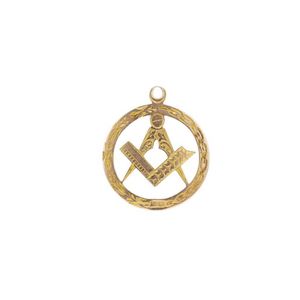
Antique Rose Gold Masonic Fob Medal with Rubbed Marks
Antique rose gold Masonic fob medal rubbed marks. Approx weight 2.5 grams, dia. 25 mm, tests as 12ct
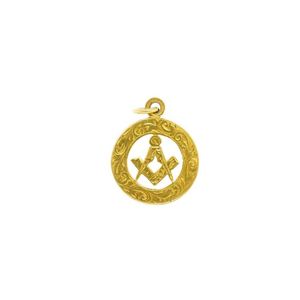
Edwardian 9ct Rose Gold Masonic Fob Medal, Birmingham 1906
Edwardian 9ct rose gold Masonic fob medal marked Birmingham 1906 William Hair Haseler. Approx weight 2 grams

1919 George V 9ct Rose Gold Masonic Star Fob Medal
George V 9ct rose gold Masonic Star fob medal marked Birmingham William Walter Cashmore 1919. Approx weight 4.2 grams

Antique 9ct Rose Gold Masonic Euclid Fob Medal, 4.8g
Antique 9ct rose gold Masonic Problem of Euclid fob medal. Marked 9ct L.S Anchor. Approx weight 4.8 grams
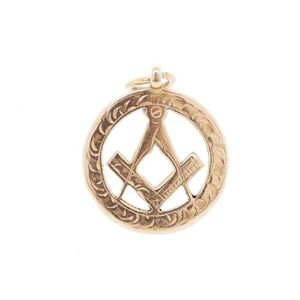
1945 William Adams Birmingham Masonic Fob Medal, 4.4g
George VI 9ct rose gold Masonic fob medal marked Birmingham William Adams 1945. Approx weight 4.4 grams

1894 Victorian Masonic Fob Medal, 9ct Rose Gold, Birmingham Marked
Victorian 9ct rose gold Masonic fob medal marked Birmingham 375 1894. Approx weight 2 grams

Antique 15ct Gold Masonic Medals, Early 20th Century
Masonic medals. Two antique 15ct gold examples, one suspended on blue silk ribbon, early 20th century, 23+ grams gold weight

Silver Gilt Masonic Medals with Grosgrain Ribbon - 56.2gms
A pair of Masonic medals, crafted in silver gilt with grosgrain ribbon, total weight 56.2gms.

Australian Masonic Medal, 1943
An Australian 9ct gold masonic medal, 1943, the medal featuring a square and the 47th problem of Euclid within a wreath, with additional pierced and engraved symbols and mounts upon a pale blue gros grain ribbon, engraved presentation inscription verso to…

Gilt Masonic Folding Orb/Cross Fob
A circa 1900 gilt Masonic folding orb / cross fob, the sphere with four clasps opening to release the cross with Masonic emblems. Length extended 3.6 cm.

9ct Rose Gold Masonic Fob with J.G. & S. Mark
A New Zealand 9ct rose gold Masonic fob, stamped maker's mark J. G. & S. 3.33gm.

9ct Gold Masonic Medal with Symbols and Monogram
A 9ct gold Masonic medal, medal featuring a square and 47th problem of Euclid within a wreath surround to border applied with other symbols on a blue ribbon surmount with 9ct fittings with monogram and scroll mounts for Lodge Phillip No.509 Ugl NSW size…

Masonic Regalia and Memorabilia: Aprons, Ribbons, and Medals
Masonic (Freemasons) Regalia and memorabilia two aprons, three ribbons and four silver medals

Masonic Regalia and Memorabilia Set
Masonic (Freemasons) Regalia and memorabilia two aprons, two ribbons and various miniature medals and pins

Masonic and Foresters Regalia and Memorabilia with Medals
Masonic (Freemasons) Regalia and memorabilia three aprons and sash of the ancient order of Foresters with medals and badges attached

Masonic Regalia and Memorabilia Set
Masonic (Freemasons) Regalia and memorabilia medal sash of ten medals to brother G H Toothill, of Oamaru with other sash, two medals and booklets

Brisbane Masonic Medal with Diamonds and Inscription
Somers of Brisbane Masonic Medal. Fine 9ct gold example set with three brilliant cut diamonds, stamped 'Temperance, Brisbane, No.123' and engraved on the reverse 'Pres. To Wor. Bro. J.M. Wallace R.M. As A Token Of Esteem By The Brethren, 6/8/55' stamped '…

Vintage 9ct Gold Masonic Fob Pendant and Pin Brooch
Two vintage 9ct gold Masonic jewels, an engraved fob pendant and small pin brooch. 4.98gms.

Vintage Masonic Rose Gold Cufflinks - Engraved Hexagonal Form
A pair of vintage 9ct rose gold Masonic engraved cufflinks, hexagonal form. 6.75gms.

Masonic Rose Gold Fob Pendant with Chalcedony Panel
A circa 1900 Masonic 9ct rose gold, half orb fob pendant, applied with various tools, the end set with engraved chalcedony panel. Total weight 5.4gms.

Enamel Masonic Fob Pendant in 9ct Rose Gold
An early 20th century 9ct rose gold and enamel masonic fob pendant, the square with suspended blue enamelled disc. 3.1gms.

Masonic Fob Pendant with Pounamu and Gold Fittings
A circa 1900 9ct and pounamu circular Masonic fob pendant, the pounamu ring with gold fittings and central square and caliper tools. Diameter 2.8 cm.

Vintage 9ct Gold Masonic Fob Spinner with Engraved Motif
A vintage 9ct gold Masonic fob spinner, Engraved square and caliper motif. 5.8gms.

18ct Gold Masonic Jewel with Citadel No.1897 Engraving
A heavy 18ct gold Masonic jewel, suspended from a blue ribbon with two bars and pinned gold castle emblem. Detailed 'Citadel No.1897', presentation engraved and dated 1958-59 verso. London made. Total weight 36.2gms.

1898 Masonic Jewel with Presentation Details
A circa 1898 15ct gold Masonic jewel, suspended from a blue ribbon with three gold bars, engraved Coromandel Lodge with presentation details on reverse and date 1898. Total weight 18.6gms. In Morocco leather box.

1950s 9ct Gold Masonic Jewel with Ribbon and Bars
A circa 1950 9ct gold Masonic jewel, suspended from a blue ribbon with three gold bars. Engraved Ohura Lodge with presentation details verso. Stamped makers mark for Mayer & Kean Limited. Total weight 35.8gms.

Enamel Masonic Medal with 9ct Rose Gold (Australia)
Australian mid century 9ct rose gold and enamel masonic medal. marked 9c to the medal and brooch. Engraved: G.L of A 1591 Presented to Bro. T Lancaster PG by Lakemba ldoge no.177 IOOF 1923- 1948, weight 11.6 grams

Antique 9ct Gold Masonic Lodge Badge with Blue Ribbon
An antique 9ct gold Masonic Lodge badge, blue ribbon with gold fittings inscribed 'Lodge Sydney T.G.R no. 505 U.Gl.N.S.W', suspending pendant with Masonic symbols, with inscription to rear dated 7.11.36, size 13 x 5 cm, wt. 34.17g.

Masonic Neck Jewel with Cryptic Inscriptions and Symbols
Late 18th century Masonic neck jewel, in carved ceramic or stone (of similar appearance to ivory or bone), of quatrefoil form, incised front and back with Masonic text in a cryptography, reading 'Prepare to meet thy god' and 'A child of god, King of Kings…
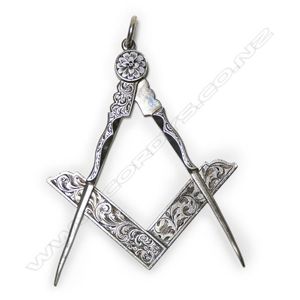
19th Century Silver Masonic Calipers and Square Jewel
George Young (Dunedin) 19th century silver Masonic jewel, as a pair of calipers and square, engraved with scrolls. Suspension loop to the top. Stamped maker's mark to reverse 'GY' recorded as pre-1876, height 8.5 cm.

1885 Freemasons Gold Jewel with Engraved Square Panel
Goldstein & Moller (Dunedin) 18ct gold 1885 Freemasons jewel, the engraved square presentation engraved and dated 1885, with suspended pierced and engraved square panel. Stamped maker's marks, width 7.2 cm. 17.5gms.

Silver Masonic Dove Peace Jewel with Lodge Engraving
Julius Hyman (Dunedin) silver masonic jewel, solid cast as a dove of peace, suspension loop to top, engraved to reverse 'Hiram Lodge No.1127', height 6 cm.

Masonic Gold Ball Fob with Engraved Symbols
A 9ct yellow gold Masonic lodge ball fob, with a cruciform clasp releasing six pyramidal sections to form a cross engraved with Masonic symbols.

19th Century Masonic Watch Chain with Silver Fob
An antique sterling silver Albert watch chain with Masonic fob, 19th century, 31 cm long
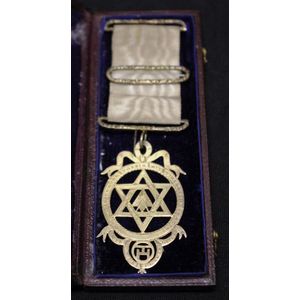
Antique Masonic Jewel Pendant in Fitted Case
Early cased Masonic Jewel pendant with ribbon and pin, in early fitted case.

Antique Masonic Medal, 9ct Rose Gold, 1903
Antique Australian 9ct rose gold Masonic medal jewel of office, marked L.I Flegeltaub 1903-19 9ct. Approx weight 15 grams, width 38 mm. For Lodge Cavenbah no 231. :Presented to Bro J.W. Mildenhall 1909

Antique Masonic Medal, 9ct Rose Gold, Sydney 1910-24
Antique Australian 9ct rose gold Masonic medal marked for kitchen & Bingham Sydney 1910-24. For Lodge Cavanba 1922. Approx total weight 30 grams, including metal parts
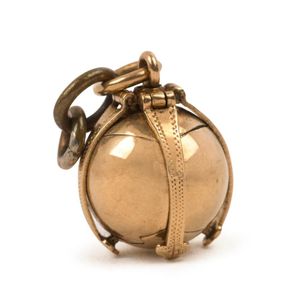
Vintage 9ct Gold Masonic Ball & Cross Charm
Masonic ball & cross mechanical 9ct gold vintage charm, 6.3gms.

Sterling Silver Masonic Medals with Angel and Inscriptions (2)
Two sterling silver Masonic medals, hallmarked Birmingham, 1927/1933, with compass and set square above an angel, flanked by dates 1914-1918, with inscribed names verso, total weight 56gm (2)

Masonic Medal with Garnet and Enamel Detail
A gold Masonic medal, inscribed provincial grand black chapter, Victoria, engraved, with rope twist border and scrolled detail, presentation details to verso, set with garnet-and-glass doublets and an enameled cross, on a ribbon with skull and cross medal…

Australian Masonic Medallion, Sterling Silver, No. 474, 44g
Australian sterling silver Masonic medallion, stamped 'Stg' and engraved 'No.474', 7.5 cm diameter, 44 grams

9ct Gold Masonic Jewel of Office - 8.6g, 60mm
9ct yellow gold Masonic jewel of office marked 9ct Somers. Approx weight 8.6 grams, length 60 mm

1930 Masonic Templar Star Medallion with Enamel & Ribbon
Sterling silver Masonic Templar star medallion, hallmarked Birmingham, 1930, R.S (Spencer and Co.), decorated with white enamel, set below a black ribbon and floral adorned top bar, total height 8.5 cm, medallion width 4 cm, in original case

Masonic Enamel Medallion with Birmingham Hallmark, 1934
Masonic sterling silver and enamel medallion, hallmarked Birmingham, 1934, R.S (Spencer and Co.), the medallion in the form of a six pointed star, in gilt on sterling silver with enamel accenting, medallion reads 'St Martins chapter No.2455' set below…

Masonic Red Cross Medallion with Case
Masonic Knights order of Red Cross medallion, gilt on sterling silver, hallmarked Birmingham, 1929, R.S (Spencer and Co.), decorated with red enamel, set below a red and cream ribbon and floral adorned top bar, total height 8 cm, width 4 cm, with original…

Masonic Queen Victoria Jubilee Medallion with Case
Masonic Queen Victoria Jubilee medallion in case, hallmarked sterling silver, London, 1897, manufactured by Spencer and Co, decorated with gilt overlay, enamel and stone borders, set below original ribbon, (a/f) and wreath top bar, in original case,…

1929 Gold Masonic Medallion with Enamel Inset and Ribbon
9ct gold Masonic presentation medallion, hallmarked 375, London, 1929, Gk&S (G.Kenning & Son), the medallion of circular form, finely decorated with central crown and triangle within the text 'William Preston chapter No.766', featuring inset red enamel,…

Gold Masonic Medallion with St. Martin's Lodge Insignia
15ct gold Masonic medallion, hallmarked 625, Birmingham, 1899 and 1907, R.S (Spencer & Co.), the medallion set with top ribbon and bars with inset plaque depicting St. Martin on horseback, with text reading 'St Martin's Lodge No.2455', set above three…

9ct Gold Masonic Medallion with Crown and Triangle
9ct gold Masonic medallion, hallmarked 9ct, the medallion of circular form set with a crown above a triangle, the obverse with inscription dated 6.8.1932, set below a maroon ribbon accented with three gilt top bars, total height 10.5 cm, medallion width 3…

9ct Gold Masonic Medallion with Presentation Engraving
9ct gold Masonic medallion, hallmarked 9ct, the front inscribed 'Life Governor No.168' within an oval wreath and set below compass and set square, the obverse with presentation engraving dated 13.10.1941, height 6.5 cm and width 3.5 cm, total weight 11…

Masonic Pendants: Silver Set Square and Gilt Deacon Jewel
Two Masonic pendants, comprising a sterling silver set square decorated with clear stones, height 8.5 cm, and a gilt oval deacon jewel decorated with blue enamel, height 7 cm (2)

Sterling Silver Masonic Jewells with Engravings
Two Masonic medal Jewells in sterling silver by Toye & Company London 1949. Front side Israel chapter number 2691. Reverse side presented to 'Ex Comp Alec Levy.' in recognition of his valuable services. As Mez 1954 - 1955. Complete with box. The second…

Boxed Collection of Gilded Masonic Silver Medals
Collection boxed Masonic gilded silver medals a total of approximately 14 gilded silver Masonic medals, each individually boxed with ribbons, included in a vintage leather leather carry case.

Enamel and Silver Medals and Badges Collection
Collection various medals & lapel badges a total of 11 various enamel and silver medals and badges, including enamel 1939 St George motor boat club, NSW Masonic club, etc.

Masonic Badge in 9ct Gold with Blue Ribbon
A 9ct gold Masonic badge with wreath, lyre and star motifs on a blue ribbon with fittings, cased, wt. 17.8gms including ribbon and fittings

Pair of 9ct Gold Masonic Medals from Monaro Lodge
Two 9ct gold Masonic medals both for Monaro Lodge, with engraved star and rules. One box only. Total weight including ribbons and fittings 34.6gms. (not all fittings are marked 9ct)

Gilt and Enamel Masonic Jewels from Punjab, India
Three gilt and enamel Masonic jewels including one Hallmaked sterling, Punjab India

St Andrew Lodge Masonic Medal, 9ct Gold, 1954
A 9ct yellow gold Masonic medal, St Andrew Lodge Townsville, inscribed to the reverse 'Presented to Wor Bro C. F. Green P.M as a tolken of esteem by the brethren 14.8.54'. Stamped 'Somers 9ct', length 3.2 cm

18ct Gold Masonic Pendant by H. Steiner, Adelaide
An 18ct gold Masonic pendant by H. Steiner, Adelaide, stamped '18ct' and 'H Steiner, Adelaide' in box.

15ct Gold Masonic Past Masters Jewel with Filigree Bar
A 15ct gold Masonic Past Masters jewel, on gold filigree bar, the ribbon with gold Lodge band, on 15ct gold fern pattern suspension pin, c.1917, maker's mark S.D, in case. Total 23.2gm

9ct Gold Masonic Scribe-E Jewel with Ribbon and Case
A 9ct gold Masonic Scribe-E jewel, in case with ribbon. Medallion alone 10.8gm.

19th Century Hair Twist Plate Albert Chain with Masonic Medallion
Late 19th century hair twist plate Albert chain, with 9ct masonic medallion attached, New Zealand maker

Australian 9ct Gold Medals for Restoration
Three Australian 9ct gold medals for restoration. Includes a Masonic medal marked Willis & Co 9c, a Kangaroo and map example marked Aronson 9c, as well as a Tasmania medal marked 9c. Approx weight 4.7 grams
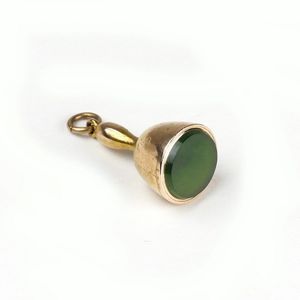
Masonic Gold Mallet Pendant with Greenstone Panel
A Masonic 9ct gold and greenstone pendant in the form of a mallet with a greenstone panel to the base.
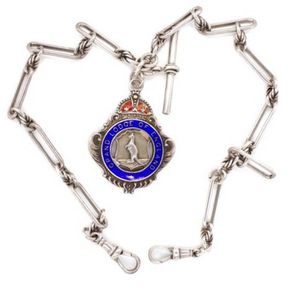
Edwardian Silver Fob Chain with Masonic Medal
Edwardian silver fob chain and Masonic medal the chain has fetter links and is marked 1906 Birmingham John Thompson & Sons, the enamel and silver badge is for the grand Lodge of England and decorated with a kangaroo to center. Marked Chester 1939. Approx…

Masonic Regalia Collection: Griffith Lodge 1947
A collection of Masonic Regalia, Griffith Lodge, 1947, including a craft apron, Royal arch Principal apron & Masonic medals

Antique Masonic Fob Chain with Gold Swivel
An antique gold fob chain with Masonic swivel, 15ct yellow gold, hallmarked to bulldogs and t-bar, presented as a classic solid linked curb chain of uniform sized links, fitted with double bulldog clips, suspending a sliding t-bar on chain links,…

Masonic Apron and Accessories Set
Masonic: Case named to D S McHutchison, containing apron, cuffs, sash, medals & tie pin, generally fine condition.

18ct Masonic Pin in Original Box
A Masonic pin, 18ct yellow gold. Weight 3.7g. In original fitted box.

Gold Fobs: Athletic and Masonic Memorabilia
Two gold fobs. Australian 9ct gold fob by Willis, inscribed on the reverse side '100 Yds Senior Championship. On the obverse side within a shield the initials Ln. 6.05g. Together with 15ct Masonic fob 3.05g

Antique Masonic Seal with Uncut Hardstone Panel
A c.1900 15ct. yellow gold Masonic type seal, circular dark red uncut hardstone panel, the frame of key and ladder design.

Vintage Masonic Jewels with Queen Victoria Bust
Five vintage Masonic jewels, includes four silver gilt, one with a bust of Queen Victoria within a diamond form frame of faux diamonds and enamelled 1837-1897, another with elaborate gilt decorated red sash

Gilded Masonic Jewel with Presentation Box
A gilded 9ct. rose gold large Masonic jewel, the top architectural bar dated 1961/62, the applied gold disc detailed 'Ararangi No. 297, the pendant square below presentation engraved. In original presentation box. 33.4gm including ribbon

1947-48 Masonic Jewel in Gilded Rose Gold with Presentation Engraving
A 9ct. gilded rose gold Masonic jewel, the ribbon with bars and pinned fern detailed 'Lodge Te Puke' and dated 1947-48, etc., presentation engraved, in original box. 23gm

Antique Masonic Gold and Silver Fold Out Charm
An antique gold and silver Masonic fold out charm, 9ct gold cube folding out to cross form with 6 pyramid sections in silver gilt depicting various symbols, 45 x 35 mm expanded, 1 bracket broken.

Freemasons Memorabilia: Medals, Certificate, Ritual Booklet, Plate, Cuff-links (1929-1988)
Freemasons: Masonic Medals 'Life Governor/Royal Freemasons Homes' & '50 Years Service'; 1929 Freemasons Certificate & Ritual booklet; also 1988 Australia Bicentenary plate and a pair of cuff-links.

Antique Masonic & Spinning Fob Set: Gold & Gemstone
Two antique gold cased keywind fobs, a masonic symbol, other a spinning fob set with bloodstone and carnelian onyx.

HMS Duke of York: A Masonic Connection
The Badge (ship's plaque) of the Battleship HMS Duke of York. The battleship HMS 'Duke of York' spent some time in Sydney shortly after the end of World War II. Crew members made numerous friends among Sydney Freemasons and as a new Masonic Lodge was…
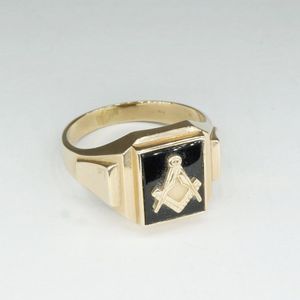
Masonic Onyx Gold Ring, 9ct, Size Y
9ct yellow gold men's onyx ring with Free Masons symbol and gold inlay, 6.6g, size Y, 7g

9ct. Rose Gold Masonic Ball Fob with Gold Chain
An early 20th century 9ct. rose gold and silver Masonic ball fob, the ball unhinging from a four-claw mount to form a cross, with a modern 9ct. gold twist chain (7.47gms).

Masonic Medals: Gold and Silver Life Governor Awards
Two various Masonic medals, including gilded medal, marked 'Fbi, Life Governor,' and a sterling silver medal, marked 'Lodge Belmore Lewis, 1975, Life Governor

George V 9ct Gold Albert Chain with Masonic Charm
George V 9ct gold Albert chain t-bar and charms, marked 1930 Birmingham Wjs. Australian Masonic charm 9ct approx total weight 16.2 grams. 32 cm chain length. Unmarked gilt metal propelling pencil

Masonic Lodge Medal with Silk Ribbon
Masonic sterling silver medal, titled the lodge, gilt with silk ribbon

Masonic Regalia Collection with Maltese Cross Cap
A collection of Masonic regalia and jewels, etc., including a velvet cap with a Maltese cross badge.

Rose Gold Albert with Masonic and Agricultural Medals
9ct Australian rose gold Albert with 2 fob medals, one x Masonic & one agricultural c1895, length 36.5 cm, width 28.4g

1863 London Hallmarked Masonic Badge in Sterling Silver & Enamel
Sterling silver & enamel Masonic badge, hallmarked London 1863

Early 20th Century Masonic Jewel with Enamel Shield
A West Australian 15ct yellow gold Masonic jewel early 20th century Ophir Lodge, 43 WAC made by Stewart Dawson & Co the jewel set with a small old cut diamond, enamel shield depicting steam ship between two kangaroo's height 10.5 cm (AF-ribbon) total…
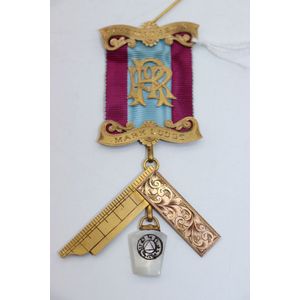



 Loading more...
Loading more...